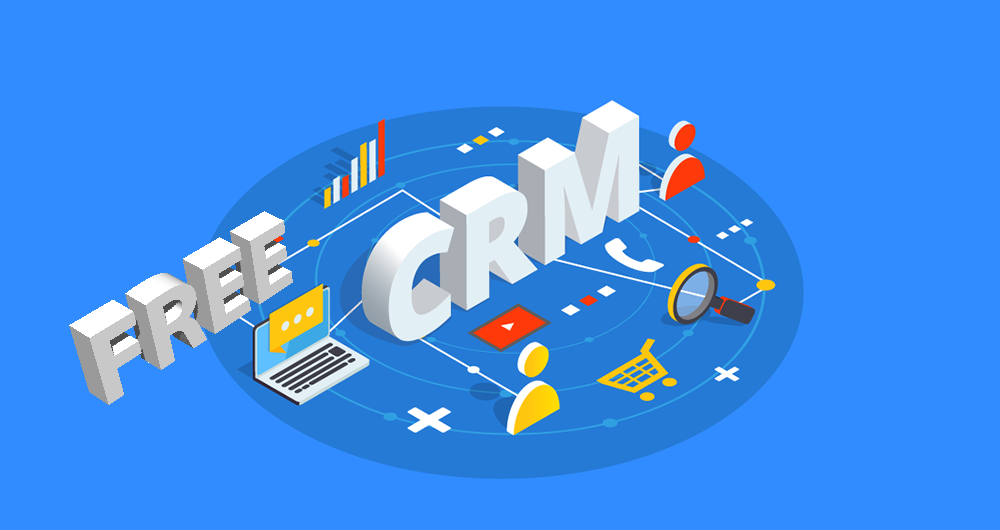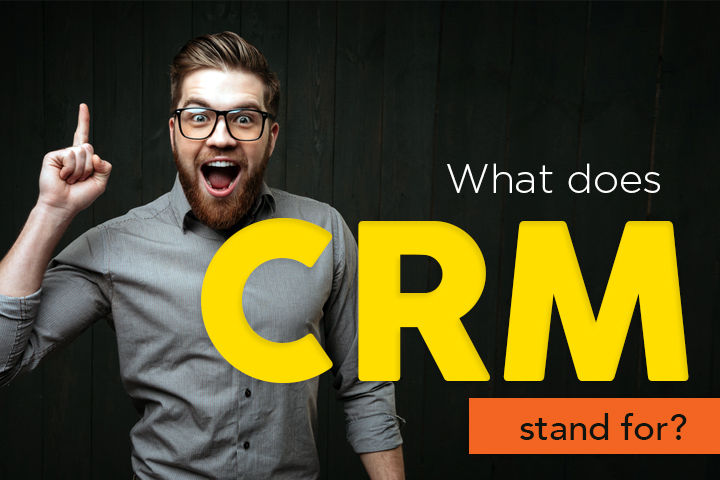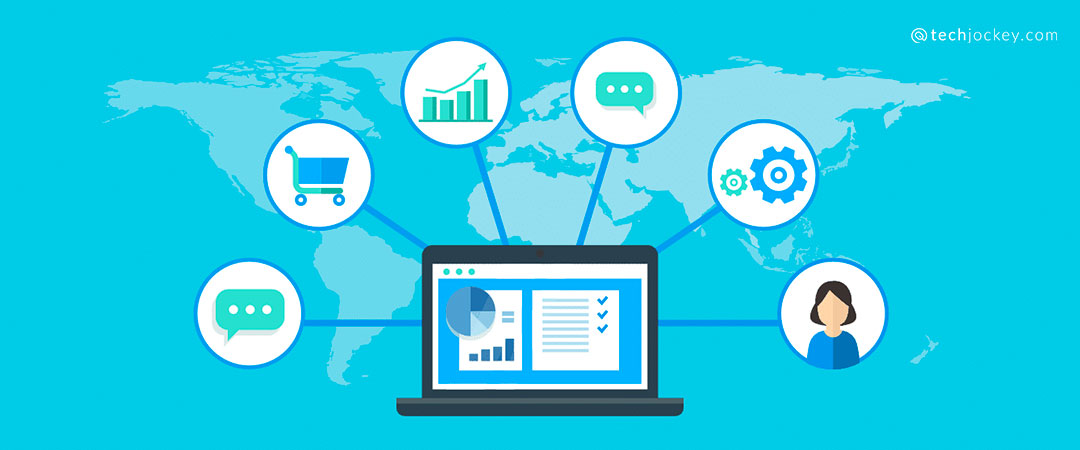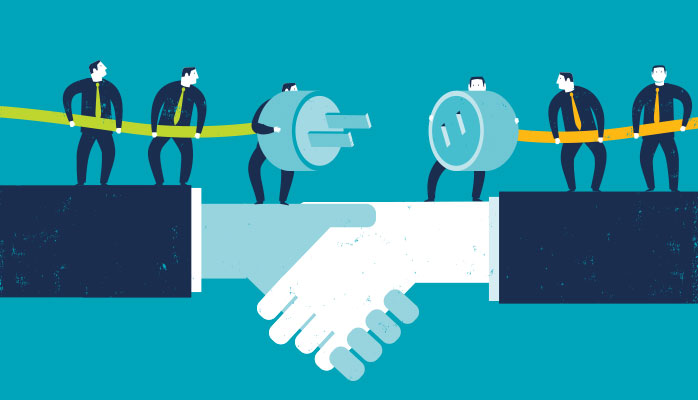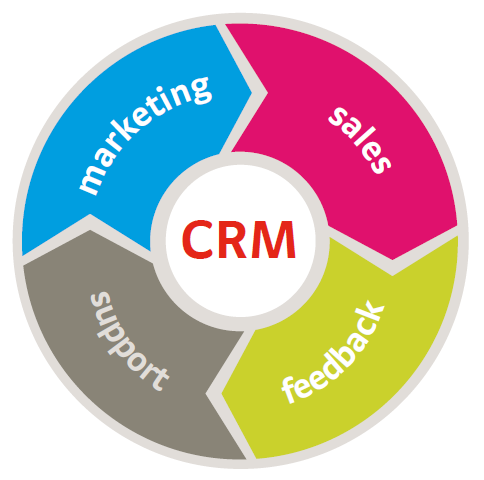You may have heard of CRM, or Customer Relationship Management. A very popular concept, it has now become one of the cornerstones of business management.
Indeed, customer data management is set to be the workhorse of marketing campaigns: mastering Customer Relationship Management is the key to running a successful business.
Managing the vast amount of customer data, however, is no easy task. In order to achieve this, countless CRM software have been developed, differing in functionality and method.
Confronted with so many solutions, you may be asking yourself: “Which CRM is best for me?”
Let’s take a look at some tips to help you find the best CRM for your company. In this article, you’ll find a comparison of the best CRM software of 2021.
What is CRM software?
The acronym CRM refers to Customer Relationship Management, i.e. the set of strategies aimed at managing a company’s relationships with potential and existing customers.
CRM software is a program supporting Customer Relationship Management, which helps companies in organizing their customer relationships.
While CRM tools were once only used to manage customer relationships, nowadays they have become real systems for managing marketing, sales and all contact and operational data. In fact, CRM software is also used to identify new leads and attract them to the company, to encourage the conversion of prospects, to carry out follow-up, and so on.
CRM software is used with the aim of simplifying processes within a company, optimizing them and thus increasing productivity. They are technological solutions, often cloud-based, that allow teams to record, store, analyze and create reports on interactions between the company and its customers. These programs are very useful in determining customer loyalty and personalizing the customer experience.
New CRMs: evolution at your fingertips. But do you really need them?
CRM software is a very useful tool for business management. But how can you tell if you really need them?
Answering a few questions will help you decide:
- Do you need a consistent contact management program?
- Are you looking for a suitable solution to accelerate and automate sales?
- Would you like to provide better customer experience and support?
If the answer to these questions is yes, then it’s time for you to acquire a CRM software.
Best CRM: which one should you choose for your company?
Choosing a customer relationship management (CRM) system starts with assessing your business needs and objectives. The best CRM for a company is in fact the solution that works best for the company itself: there are no objective rankings, but only preferences dictated by the modus operandi and the aims pursued by a given business.
First of all, you have to start the selection process by starting from the assumption that not all CRM solutions are the same, just as not all businesses are the same. Common to all businesses, however, is the fact that to remain competitive they need to offer quality experiences to their customers, and to do this they need a particularly capable CRM solution.
In fact, every business needs a CRM solution that connects all relevant contact data and intelligently presents it to sales partners, vendors and customer service representatives.
How does CRM software work?
Before you can choose the best CRM solution for your business, it is important to understand what CRM is and the benefits it offers.
Every company practices CRM at some level, but in many cases there is a lot of room for improvement. There are many companies that use non-functional or incompatible practices that are inadequate when it comes to providing business teams with a complete view of every customer relationship. With the right CRM solution, however, it is possible to track and analyze the entire customer journey.
In general, CRM software supports the recording of customer contact information. This includes: telephone number, e-mail address, preferred contact channel, social media profile.
After being recorded, the information is organized and kept available: as a result of these operations, the company will have comprehensive reports on its network of contacts. Thanks to this overview, the management of customer relations itself can be visibly improved by the release of key information useful for the implementation of more profitable exchanges. CRM software offers a 360-degree view of the customer, enabling you to develop effective offers and competitive marketing strategies.
How much does a CRM solution cost?
The cost of CRM software is very variable: it is even possible to find some software that is completely free. Normally, different pricing plans are available for each software, depending on the functionality of the software.
All major CRM vendors usually provide the possibility to pay on a monthly or annual basis, as well as to extend or restrict the range of services offered with relative ease.
CRM software: why is it useful?
Thanks to the use of CRM software, a company can ideally deepen and implement its customer relationships: it allows to create lasting relationships and, at the same time, to strengthen existing ones. In fact, CRM systems make it possible to increase customer loyalty on the one hand and to strengthen the acquisition power of leads and prospects on the other.
CRM solutions usually offer the possibility of viewing in a customizable dashboard all the data related to the customer and their history with the company, an overview of their orders and any problems that have arisen, etc.; a CRM software therefore allows you to:
- Get more leads, more revenue and more customer value in the long run;
- Offer more personalized customer experiences and marketing activities;
- Increase customer satisfaction and engagement;
- Strengthen proactive and predictive sales capabilities to increase brand potential;
- Discover insights that can be used to devise marketing strategies and drive business growth.
Delivering a good customer experience is crucial: it is a prerequisite for building lasting customer relationships and increasing brand loyalty. To do this, however, you need to understand your customers well, but you can’t understand what you can’t see. This is where CRM software comes in: by linking all customer data and displaying it in the dashboard, it enables fast and effective management.
Decisions based on the data in a CRM system automatically become more reliable. By strengthening customer relationships, you can grow your business on the basis of artificial intelligence, which will help you process data faster and more accurately.
Best CRM: how to choose the right solution?
What should you start with? First, you need to assess your specific business needs, assuming that the best CRM solution is the one that works best for your company.
Start your research by reviewing your company’s current set of processes, requirements and goals. Consider:
- How have you organized your customer data so far? Who has access to it?
- Have you implemented the necessary safeguards and controls to ensure data privacy and compliance?
- Is your customer data available to all sales, marketing, field and customer service teams?
- How are you leveraging the data you already have on existing and potential customer relationships?
- How much time do your employees spend on repetitive routine tasks and CRM data entry?
- What processes do you use to get a complete view of your customers?
- Can you understand the interactions customers have with your brand during the customer contact journey?
Now that you have a better understanding of your current situation and have looked at how a CRM solution could lead to improvements, it’s time to take a look at some of the standard features that any qualified CRM system should have, namely:
- Data connectivity: any CRM solution you consider should be able to connect to all your data sources and business processes, and make that data available to everyone who needs it;
- Designed for the cloud: a Software as a Service (SaaS) solution delivered via the cloud means less IT maintenance, continuous updates for your software and more security than most companies can offer on their own;
- Mobile access: both ways and places of working have changed; nowadays, employees need to be able to access data and systems anytime, anywhere and from any device.
Looking for the best CRM solution
Now that you have worked out some basic considerations about a good CRM, you can turn to analyzing the features of the best CRM software for your company.
Zoho CRM
Zoho CRM is an integrated, cloud-based customer relationship management platform that meets the needs of companies and industries of all sizes and types. Over 150,000 companies worldwide use Zoho CRM to build lasting customer relationships and maximise team productivity.
Zoho CRM offers extensive omnichannel support by phone, email, live chat, social media. In-person meetings make Zoho CRM the most integrated system on the market. Zoho’s sales assistant, Zia, powered by artificial intelligence, provides advanced interpretations, solutions and predictions for salespeople.
With Zoho, your sales team can focus more on sales instead of data entry with the help of workflow automation, lead scoring, real-time notifications and built-in gamification.
?Features
Key features of Zoho CRM include:
– Lead management;
– Workflow automation;
– Advanced analytics;
– Process management;
– Marketing automation;
– App for iOS and Android (with business card scanner);
– Platform for developers.
✅Benefits
→ Automates routine sales, marketing and support functions, giving you more time to focus on your customers.
→ Create optimized workflows that help you reduce manual data entry, eliminate redundancies and speed up your overall process.
→ Increase the productivity of your sales team with accurate forecasts of potential revenue.
→ Set up multiple currencies and track website visitors to convert more prospects.
→ Provides Zia, an AI assistant included in Zoho CRM that can help you manage your CRM data. Zia can retrieve the information you want, take notes, predict the future of a sale, detect anomalies, automate tasks and much more.
→ Allows you to generate new leads and run targeted email marketing campaigns;
→ Allows you to compare advertising expenditure with sales revenue using Google Ads integration.
→ It offers the right balance between protecting your customers’ data and giving your employees the freedom to do their jobs. Zoho CRM succeeds in meeting both of these requirements.
?Price
- Free Edition → $0: Always free for up to 3 users. This version offers the following features:
- Leads, Contacts, Accounts, Tasks, Events, Call Log and Notes;
- Advanced Filters;
- Page customization;
- Custom list views;
- Workflow management;
- Standard reports;
- Integration with Facebook, Twitter and Google+;
- Marketing automation;
- Web modules.
- Standard Edition → $14 per month/per user. Equipped with the following features:
- Includes all the features of the free edition;
- Sales forecasting;
- Scoring rules;
- Charts and KPIs;
- Document library;
- Roles and profiles;
- Custom fields;
- Call center connectors;
- Webforms;
- Encrypted transmission;
- Workflow rules.
- Professional Edition → $23 per month/per user. Includes everything in Standard Edition +:
- Email integration;
- Social CRM;
- Sales Signals;
- Blueprint – Process Management;
- Inventory management;
- Unlimited records;
- Integration with Google Ads.
- Enterprise Edition → $40 per month/per user. Includes everything in Professional Edition +:
- Zia Voice;
- Multi-user portals;
- Goal meters, anomaly detectors, predictive AI;
- Custom modules and buttons;
- Mobile SDK and app distribution;
- Encryption at rest.
Hubspot
Today’s customers expect resolutions within minutes and 24/7 personalized service across multiple channels. But most customer service teams struggle to meet these growing demands because their tools and data live on multiple sources.
Service Hub brings all customer service data and channels together in one place and helps scale support through automation and self-service. The result? More time for proactive service, capable of maintaining and growing your customer base. What’s more, when using the full HubSpot CRM platform, support representatives can provide a more valuable service.
Whether it’s strategies, services or software, HubSpot allows you to manage your business and its complexity. HubSpot has everything you need to grow better.
?Features
- Tickets to track and manage customer issues. You can also assign specific tickets to your team members and even assign them a deadline.
- Feedback support: check your customers’ satisfaction with surveys to gather crucial feedback.
- Team emails: design state-of-the-art email aliases that automatically transform incoming emails.
- Live chat functionality: hold more engaging conversations with your customers or offer them self-service opportunities through conversation bots.
✅Benefits
- Easy conversation management through a universal inbox with email, chat, social media contacts and more.
- Automation and routing: Make sure your sales and marketing campaigns keep running at the right pace with automation and routing throughout the buyer’s journey.
- Knowledge base: Make sure you always have answers to crucial customer questions with an easy-to-access knowledge base full of useful articles and documentation.
?Price
- Starter: $50 (one user). This option offers: ticketing, live chat, conversational mailbox, call functions, chatbots, team emails, email templates and sequences, meeting scheduling, ticket reports, report productivity and time analysis.
- Professional: $400 per month. All the functionality of the Starter package is offered, with the addition of ticket status and routing services, task automation and the ability to design multiple ticket pipelines at once. There are also many self-service features, a knowledge base, video hosting and management, custom reports, surveys and an Insights dashboard.
- Enterprise: $1,200 per month. The Enterprise package includes everything you get in the Professional suite, plus access to playbooks, goals, hierarchical teams, user roles, Slack integration, single sign-on, calculated properties and webhooks for self-service.
Sales Cloud
Growing sales, building customer loyalty, and opening up new opportunities are the key benefits of Salesforce Sales Cloud. The software provider is based in San Francisco and is the originator of cloud computing. It draws inspiration from the global companies it works with to develop software that precisely meets their needs.
Salesforce offers its services for small, medium and large companies. It is therefore adapted to all structures.
? Main features
- individualized workflow rules, to adapt the response to the consumer’s action,
- intelligent customer service, to respond more quickly and accurately to user requests,
- analysis and statistics presented in the form of customised graphs to evaluate the effectiveness of your campaigns,
- an automatically updated customer database, segmentable with criteria, history of exchanges,
- the creation of personalized and targeted emails.
✅ Benefits
Very innovative software solution and the possibility of being part of a very varied community offering a lot of advice and relevant comments.
? Price
Subscriptions are degressive according to the number of users per month: offers ranging from €75 to €300 allowing access to more or less advanced features depending on the solution chosen.
Using CRM to steer your business in the right directionCRM software gives you a global and organized view of your company and also allows you to make decisions based on your information. Your data is one of your greatest competitive advantages and, when used competently, is a guarantee for your success. Have you found the solution you were looking for? Feel free to browse our complete list of the best CRM software for even more choice: don’t miss the opportunity to grow your business!

